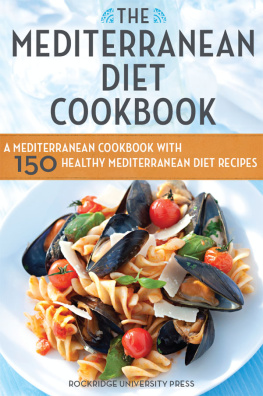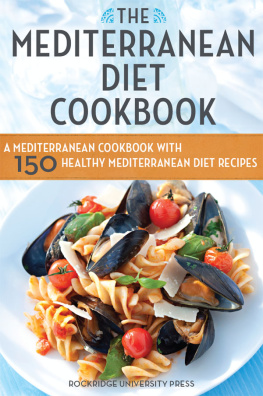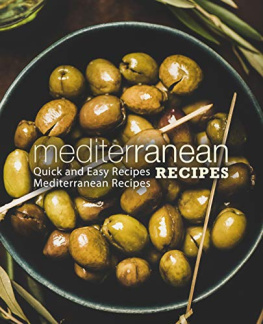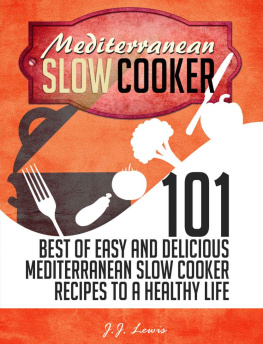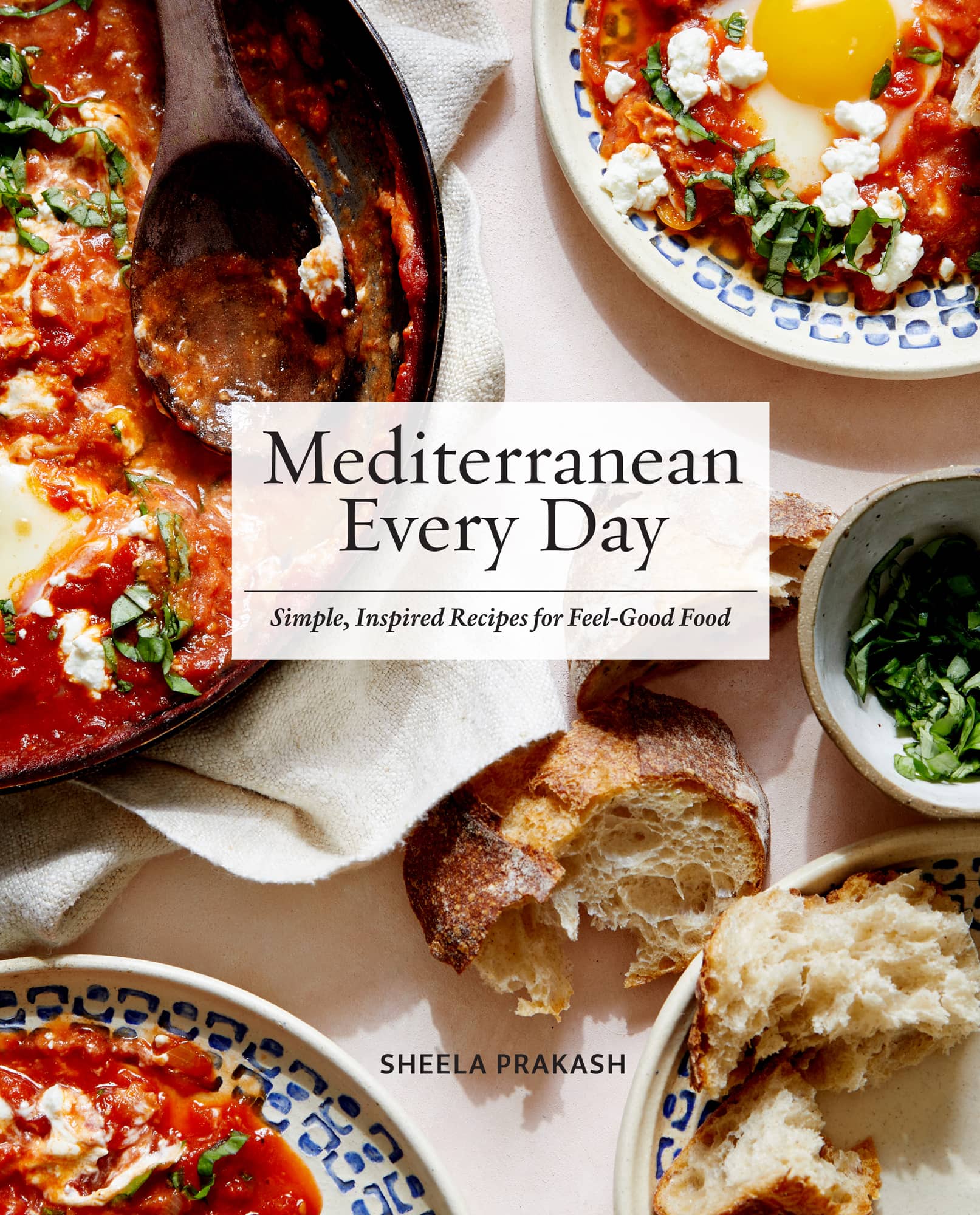Mediterranean Every Day
Simple, Inspired Recipes for Feel-Good Food
SHEELA PRAKASH

Introduction
When I think about what or who inspired my deep affection for Mediterranean cuisine, its a simple answer: Graziella. Picture the most Italian of Italian nonnea bit rotund, apple-cheeked, with an apron almost always tied around her waist. Id lived in Italy and had traveled around the Mediterranean and tasted great foodsome of the best everbefore I met Graziella, but it wasnt until her that I knew what true Mediterranean food wasthat its a feeling more than a practice.
A few days after I graduated college, I packed up my miniscule studio apartment in Greenwich Village and flew to Italy. Id studied in Florence my junior year, and the moment I left, I knew I had to return. So soon after, I applied and was accepted for a post-graduate summer internship on an idyllic farm, Tenuta di Spannocchia, south of Florence near the medieval town of Siena. There were eight of us, from all corners of the world, and we all were given specific roles on the farmI was assigned the orto, or vegetable garden.
Each day I weeded, planted, and harvested, and in the evenings Id head into the kitchen. As an agriturismo, the farm held dinner every night for its guests and Graziella was the cook. She was stubborn, relentless, and quickly became my most favorite person on the farm. Graziella didnt understand or speak a lick of English (or so she said), and yet, with my very broken Italian, we had a wonderful understanding. Id come into the kitchen each evening to help her prepare the meal. That might have meant Id stand over the pot of risotto and stir, or simply give her company while she threw together whatever vegetables I had harvested that day into a salad. She taught me that Mediterranean food is so much more casual and relaxed than the great cookbooks and restaurants tell you. Understand the true attitude behind it and youve unlocked the secret. What is that attitude? Be ridiculously unfussy.
When I returned to the States, I brought this attitude with me. Slowly but surely it became the only way I knew how to cook. My meals were inspired by my time with Graziella: Theyd honor the flavors, traditions, and overall wholesomeness of Mediterranean cuisine but be adapted depending on what happened to be in my refrigerator, the limited equipment in my tiny kitchen, how much time I had, and honestly, how motivated I really was to churn out a meal.
What made me fall in love with the food of the Mediterraneanand I think, really, what has made the entire world fall and continue to fall in love with itis its uncomplicated nature, which is exactly what this book is about.
CHAPTER 1
Where to Begin
This book harnesses the relaxed attitude of Mediterranean cooking. Each recipe isnt made to feel overwhelming or time consuming and most (though there are a few exceptions) are easy enough to pull off no matter the night of the week. This is the type of food I cook each and every night, whether just for my husband, Joe, and me or when family or friends gather around the table with us. The flavors of the Mediterraneanthe grassy olive oil, the sweet tomatoes, the fragrant herbsare what most inspire me and also just so happen to be ingredients that naturally lend themselves to wholesome, satisfying eating.
Feel confident in your abilities as a home cook, no matter your skill level, and approach these recipes with your own intuition. I hope to be a friend in the kitchen as you cook through the recipes, urging you to trust yourself, rather than someone calling to you from the pages to overcomplicate things. With this outlook, theres no doubt that what comes out of your kitchen will be delicious.

About the Mediterranean Diet
Diets come and go more quickly than I can keep up with them, which has never actually bothered me because I dont believe in any of them. As a registered dietitian, I am constantly asked for advice on how to eat or how to achieve particular health goals, and my answer is always the same: everything in moderation. Which, depending on the person, is not always well received because we live in a society that desires quick fixes. Luckily, however, there is one diet I look toward to prove my pointthe Mediterranean diet.
The Mediterranean diet isnt a diet in the traditional sense, though. Instead, its a way of eating thats been done for centuries in countries that surround the Mediterranean Sea. Each cuisine is unique, of courseGreek food is not Italian food, nor is it Spanish foodand within each country there are wide variations, but there are pillars that remain true throughout. Most importantly, nothing is off the table. Instead, the focus is on heart-healthy ingredients such as olive oil, fatty fish, and nuts, along with vegetables, fruits, and whole grains. Dairy, red meat, and sweets are hardly forbidden and instead enjoyed in moderation, as is wine. I am not the first person to reveal the diets health benefits: Its been well researched and publicized that eating this way reduces your risk of a multitude of chronic diseases and aids in weight management and overall well-being.
Most importantly, its a lifelong way to eat. Were on this planet for such a brief time that Ive never understood the point in depriving oneself. I do understand eating to feel your best, though, which is what the Mediterranean diet is all about.
From Diet to Casual Mediterranean-Style Cooking
Its important that I make this very clear: This isnt a diet book. Remember how I said I dont believe in diets?
Everything I learned from my time living abroad revealed that cooking in this healthful manner can come quite naturally, if you let it. The Mediterranean diet is a style of cooking and eating more than anything else. It celebrates the diverse flavors of the cuisine while embracing a relaxed, flexible attitude. Its about creating meals simple enough for midweek but never out of place for a weekend gathering with friends. Its about leaning on feel-good, colorful ingredients, such as fresh vegetables and fruits, spices, and herbs, to drive your meals. Its also about using what you have on hand to limit waste in the kitchen, which means its just as much about seasonality and well-rounded eating as it is about leaning on the pantry.
The recipes in this book are a practice in this unfussy manner of cooking. My hope is that you cook and enjoy them, of course, but with each recipe comes a greater purpose: that you walk away with a better understanding of this style of cooking. That, in turn, you gain the confidence to step away from the recipes and begin to play around and improvise in an attempt to create simple, wholesome meals more intuitively. Try different cheeses and herbs in pesto to see how they affect flavor, add a sprinkle of toasted nuts to a salad to lend texture, or toss extra vegetables into your pasta if you discover some in the crisper drawer that are starting to look past their prime. Most importantly, though, just have fun. If you do, then this kind of cooking comes easily.


